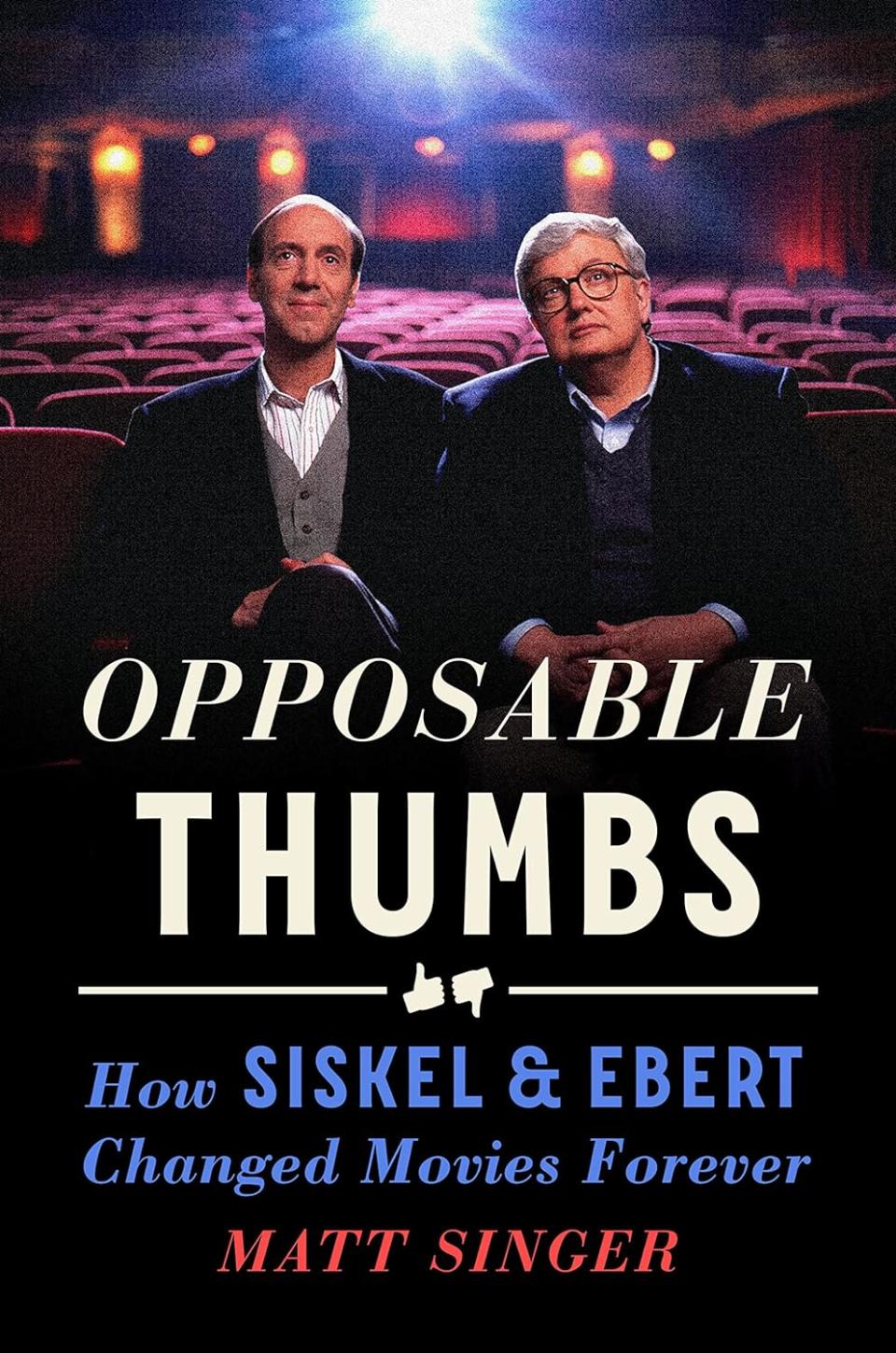Siskel and Ebert book deserves two enthusiastic thumbs up

- Oops!Something went wrong.Please try again later.
If you need a last-minute holiday gift idea for the cinephile in your life, you could do worse than picking up Matt Singer’s “Opposable Thumbs: How Siskel & Ebert Changed the Movies Forever.”
In this entertaining biography, the writer looks at how competing Chicago critics Gene Siskel and Roger Ebert not only became household names, but modified the public’s impression of critics and impacted the culture.
Like any good Siskel and Ebert story, Singer digs into the pair's championing of films and directors. Often, their stamp could make a film a hit. They also lobbied the Academy to change their rules to make the best documentary prize more accessible. And they argued for an alternative to the “X” rating. All those stories are here. Few critics can boast such a successful track record of influencing the film industry at-large.
Why were they so influential? What was it about this pair of dopey-looking Midwestern journalists donning bad sweaters that made them omnipresent? The book is a good invitation to look back on what made Siskel and Ebert so great and how it sparked a generation of movie lovers — such as myself — to think about criticism in a different, better way.
Ebert didn’t want to be a film critic. He toiled at the Sun-Times as he pursued a doctorate in English.
Siskel was a Yale philosophy grad who hung out at the Playboy mansion. They got paired on a local television show that barely made it past the pilot.
Producers saw something in the pairing. It wasn't chemistry; they weren’t all that close personally, and seemed outwardly hostile to one another at times. No, it was more of a rapport. Like watching champion tennis players taking their best shots in each other’s direction.
It wasn’t so much that they were good at arguing. Or they were good at talking about movies. It was a matter of making criticism accessible.
Largely academic for decades, film reviews often read like abstracts referencing obscure concepts while shunning popular fare. It was not until Francois Truffaut and his ilk at Cahiers du Cinéma that anyone even attempted to treat popular filmmakers, like Hitchcock, with any type of seriousness. Pauline Kael was straightforward, if not often contrarian, and became a celebrity in her own right with the ability to make or break a movie.
Siskel and Ebert offered clear-eyed simplicity. The hook of the “thumbs up, thumbs down” review caused more harm than good in the long-run, but it offered a starting point for audiences when the show went into syndication. You could work backwards from the enormously deductive rating thanks to their articulate, straight-forward analysis. They could make their case as to why a film worked, or why it didn’t, in a way that made sense to a layperson.

The pair will always be remembered for their arguments and the hilarious exuberance they brought to their exasperation. As though their Midwestern politeness couldn’t take it any longer. The “Full Metal Jacket” – “Benji the Hunted” episode is a masterclass in melodramatic meltdowns. Go and YouTube it, you’ll thank me.
But what will always stand out to me is when they both loved a movie. How their enthusiasm would bounce off one another as they explained how the director approached material or dissected moments of a great acting performance. It wasn’t just opinions; which is where most critics stop. They could talk process and method. They could explain how the film worked as well as it did.
They had to do it quick. They would profile four to five films an episode. Anyone can drone on — being concise and precise is hard work. Although this is exactly what made them as good as they were. It made them popular, getting to yuk it up with Carson and Letterman.
Moreover, it made the movies they loved popular. Arguably films like “Nashville,” “Hoop Dreams,” “Do the Right Thing,” and “Fargo” wouldn’t be the classics they were if not championed by Siskel and Ebert. Don't take my word for it: filmmakers will tell you the pair were instrumental in their success. Their passion was infectious.
As a kid who dreamed of when he could get to see a movie, I would listen to Siskel and Ebert with reverence. They made me think about films beyond my surface reaction. I thought about why and how I liked movies from watching them and reading their reviews. I would record their show because it was always on when I was doing farm chores (my background is … complicated) and would watch segments over and over.
My copy of Ebert’s “Movie Yearbook” was dog-earned and worn. Quite like Siskel and Ebert themselves, I never took film theory classes in college. All I had to learn from was those two.
Now they're both gone. Siskel for nearly a quarter of a century; Ebert for 10 years. Most critics will never be remembered. But these two have statues erected in their memory. They have this book written about them. Because they made film criticism into a populist form of art. They made reviewing films accessible and made it feel like anyone could do it. They made the Midwestern personality a strength rather than a bore. No one could do it like them.
Forget about getting this for the film fanatic in your life. Anyone you know could enjoy finding this tome under the tree.
James Owen is the Tribune’s film columnist. In real life, he is a lawyer and executive director of energy policy group Renew Missouri. A graduate of Drury University and the University of Kansas, he created Filmsnobs.com, where he co-hosts a podcast. He enjoyed an extended stint as an on-air film critic for KY3, the NBC affiliate in Springfield, and now regularly guests on Columbia radio station KFRU.
This article originally appeared on Columbia Daily Tribune: Siskel and Ebert book deserves two enthusiastic thumbs up

